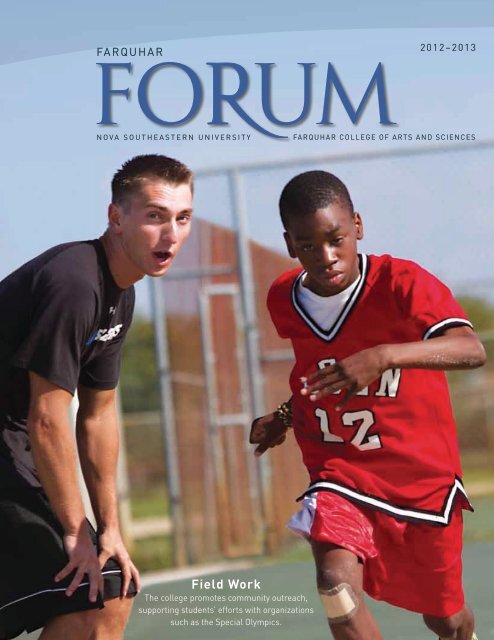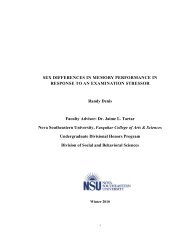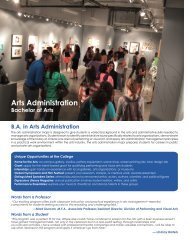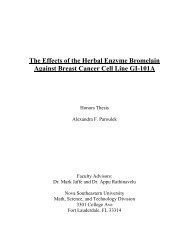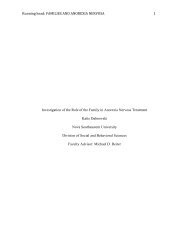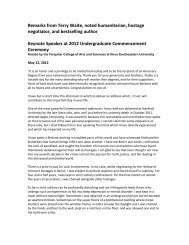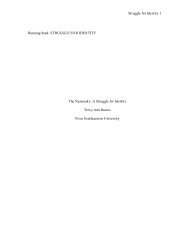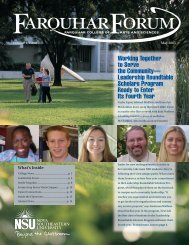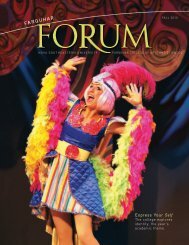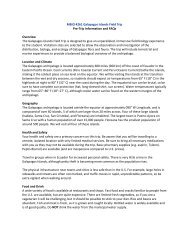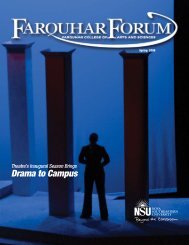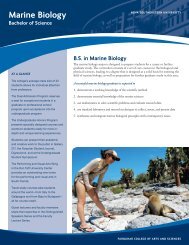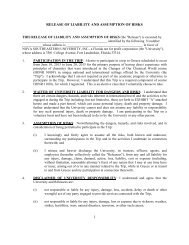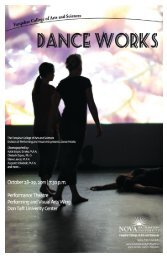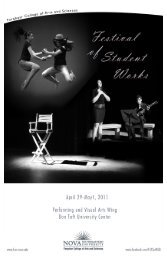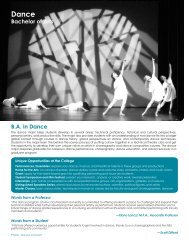2012â2013 - College of Arts and Sciences - Nova Southeastern ...
2012â2013 - College of Arts and Sciences - Nova Southeastern ...
2012â2013 - College of Arts and Sciences - Nova Southeastern ...
You also want an ePaper? Increase the reach of your titles
YUMPU automatically turns print PDFs into web optimized ePapers that Google loves.
Farquhar<br />
2012–2013<br />
<strong>Nova</strong> <strong>Southeastern</strong> University<br />
Farquhar college <strong>of</strong> arts <strong>and</strong> sciences<br />
Field Work<br />
The college promotes community outreach,<br />
supporting students’ efforts with organizations<br />
such as the Special Olympics.
ON THE COVER<br />
Life-Changing Experiences<br />
Begin in the Classroom<br />
In many <strong>of</strong> the college’s programs, students hone their skills by helping others.<br />
Service-learning experiences are being woven into the fabric <strong>of</strong> academic coursework, as students learn<br />
as much about themselves as they do about their fields <strong>of</strong> study.<br />
Featured on the cover is Kyle Latham, a 2012 graduate <strong>of</strong> the exercise <strong>and</strong> sport science program.<br />
Using what he learned in the classroom, Latham has been giving back to his community.<br />
Where some see hurdles, he sees potential in the teens <strong>and</strong> young adults with intellectual disabilities who<br />
compete in the Broward County Special Olympics.<br />
Through a practicum course, Latham volunteered to coach the Special Olympics’ local Alpine Ski team.<br />
Along the way, he discovered that he relished the chance to apply his academic training <strong>and</strong><br />
impact the lives <strong>of</strong> his 35 team members.
A MESSAGE FROM THE DEAN<br />
As the college’s 2012–2013 academic theme, the subject <strong>of</strong> “life<br />
<strong>and</strong> death” can conjure as many images <strong>and</strong> meanings as the mind allows. And, each<br />
one <strong>of</strong> us at the Farquhar <strong>College</strong> <strong>of</strong> <strong>Arts</strong> <strong>and</strong> <strong>Sciences</strong> may interpret it differently.<br />
In this issue, we speak to Krist<strong>of</strong>f Samm, a freshman biology major who arrived at<br />
NSU this fall from his native Trinidad <strong>and</strong> Tobago. To him, the equation is simple: Life<br />
begins anew in college. For Samm, that means leaving behind most <strong>of</strong> his familiar life<br />
as he embarks on new experiences in a new country, with opportunities on campus <strong>and</strong><br />
beyond—a rebirth.<br />
Students <strong>and</strong> faculty members in each <strong>of</strong> the academic divisions are experiencing <strong>and</strong><br />
examining the theme from diverse viewpoints. Throughout the year, the topic influences the<br />
college’s reading program, visiting distinguished speakers, faculty lectures, travel study<br />
courses, performances, <strong>and</strong> art exhibitions.<br />
This fall, the college opened its exhibition series with the visual art gallery show Women<br />
Outside Design 3 : Confessions <strong>of</strong> Life <strong>and</strong> Death, which approached the theme <strong>of</strong> life <strong>and</strong><br />
death from the unique perspectives <strong>of</strong> nine women graphic designers.<br />
Avoiding the obvious visual depictions <strong>of</strong> birth, death, <strong>and</strong> the afterlife, some <strong>of</strong> the artists chose to illustrate<br />
the beginnings <strong>and</strong> endings <strong>of</strong> significant passages in their lives––the inner struggle <strong>of</strong> a difficult time, or the<br />
expiration dates <strong>of</strong> failed relationships. Students, such as art major Natalie Hern<strong>and</strong>ez, helped install the<br />
exhibition <strong>and</strong> had the opportunity to meet the artists <strong>and</strong> discuss how they intertwined their personal journeys<br />
with this broad <strong>and</strong> multifaceted concept <strong>of</strong> life <strong>and</strong> death.<br />
“I feel that each artist planted seeds in our minds to ponder the reasons for life, the truth in death, <strong>and</strong> better<br />
underst<strong>and</strong> our journey from one to the other,” said Hern<strong>and</strong>ez, whose experience exemplifies the theme’s<br />
purpose <strong>of</strong> provoking discussion <strong>and</strong> introspection.<br />
Marking the beginning <strong>of</strong> a new academic year full <strong>of</strong> intellectual exploration, author Jamaica Kincaid<br />
delivered the keynote speech at our Convocation Ceremony in September. One <strong>of</strong> her novels was selected<br />
for the First-Year Reading Program, in which new students like Samm discussed the connections between the<br />
book <strong>and</strong> the theme.<br />
“Life <strong>and</strong> death doesn’t necessarily represent a physical occurrence,” Samm concluded. “The academic theme<br />
could represent accomplishments, goals, <strong>and</strong> the development <strong>of</strong> a positive value system—whether it’s trying<br />
to make the Dean’s List, pursuing academic-related goals, [or] the birth <strong>of</strong> new friendships <strong>and</strong> relationships.”<br />
In this edition <strong>of</strong> the Farquhar Forum, we focus on new chapters for our students, faculty members, <strong>and</strong><br />
recent graduates—from research in the labs to scholarly work in the arts—as the college continues to<br />
examine how our learning experiences shape our perceptions <strong>of</strong> life <strong>and</strong> death.<br />
Don Rosenblum, Ph.D.<br />
Dean, Farquhar <strong>College</strong> <strong>of</strong> <strong>Arts</strong> <strong>and</strong> <strong>Sciences</strong>
Farquhar<br />
MAGAZINE<br />
FARQUHAR COLLEGE OF ARTS AND SCIENCES<br />
DON ROSENBLUM, Ph.D.<br />
Dean<br />
Naomi D’aLESSio, Ph.D.<br />
Associate Dean<br />
Eddie DominGuez, M.B.A.<br />
Assistant Dean, <strong>College</strong> Operations<br />
Jacqueline Jenkins, Ed.D.<br />
Assistant Dean, Outcome Assessment<br />
Saul Sztam, Ed.D.<br />
Assistant Dean, <strong>College</strong> Student Affairs<br />
michael Caldwell, D.M.A.<br />
Director, Division <strong>of</strong> Performing <strong>and</strong> Visual <strong>Arts</strong><br />
Thomas fagan, Ph.D.<br />
Director, Division <strong>of</strong> Social <strong>and</strong> Behavioral <strong>Sciences</strong><br />
Matthew HE, Ph.D.<br />
Director, Division <strong>of</strong> Math, Science, <strong>and</strong> Technology<br />
Marlisa Santos, Ph.D.<br />
Director, Division <strong>of</strong> Humanities<br />
THE FARQUHAR FORUM<br />
Alyssa Rothman<br />
Director, Office <strong>of</strong> Information Services<br />
DANA Kantrowitz<br />
Assistant Director/Editor<br />
Kathleen Kernicky<br />
Managing Editor/Writer<br />
Bob Eighmie<br />
Elizabeth Braegger<br />
Photographers<br />
OFFICE OF PUBLICATIONS<br />
Ron Ryan<br />
Director<br />
Sheryl Koral<br />
University Editor<br />
R<strong>and</strong>all McCafferty<br />
Senior Graphic Designer<br />
Farquhar <strong>College</strong> <strong>of</strong> <strong>Arts</strong> <strong>and</strong> <strong>Sciences</strong>, 3301 <strong>College</strong> Avenue, Fort Lauderdale, Florida 33314-7796<br />
(954) 262-8185<br />
OIS@nova.edu<br />
www.fcas.nova.edu<br />
<strong>Nova</strong> <strong>Southeastern</strong> University admits students <strong>of</strong> any race, color, sex, age, nondisqualifing disability, religion or creed, sexual orientation, or national or ethic origin to all the<br />
rights, privileges, programs, <strong>and</strong> activities generally accorded or made available to students at the school, <strong>and</strong> does not discriminate in administration <strong>of</strong> its educational<br />
policies, admissions policies, scholarship <strong>and</strong> loan programs, <strong>and</strong> athletic <strong>and</strong> other school-administered programs.<br />
<strong>Nova</strong> <strong>Southeastern</strong> University is accredited by the Commission on <strong>College</strong>s <strong>of</strong> the Southern Association <strong>of</strong> <strong>College</strong>s <strong>and</strong> Schools<br />
(1866 Southern Lane, Decatur, Georgia 30033-4097, Telephone number: 404-679-4501) to award associate’s, bachelor’s,<br />
master’s, educational specialist, <strong>and</strong> doctoral degrees. 03-213-12RWM<br />
2 Farquhar <strong>College</strong> <strong>of</strong> <strong>Arts</strong> <strong>and</strong> <strong>Sciences</strong>
CONTENTS<br />
2012-2013<br />
8<br />
4<br />
6<br />
8<br />
12<br />
14<br />
FEATURES<br />
A NEW CHAPTER FOR AN AGE-OLD STORY<br />
Reviving the conversation on life <strong>and</strong> death<br />
FACULTY MENTORSHIP<br />
Biology student partners with pr<strong>of</strong>essor to learn outside the classroom<br />
THE WINNERS CIRCLE<br />
Symposium recognizes stellar student research, creative works<br />
THE WRITE WAY<br />
First-year composition students partner with writing fellows<br />
FIELD WORK<br />
How life-changing experiences begin in the classroom, but don’t end there<br />
16<br />
16<br />
18<br />
THE HEALING POWER OF STORYTELLING<br />
Examining the value <strong>of</strong> communication among cancer patients<br />
A LEGACY IN EDUCATION<br />
Donor-supported scholarships continue cycle <strong>of</strong> learning, giving back<br />
18<br />
20<br />
22<br />
24<br />
DEPARTMENTS<br />
Academics in the <strong>Arts</strong><br />
RESEARCH COMES TO LIFE ON STAGE<br />
Q & A with choreographer, pr<strong>of</strong>essor, dancer<br />
PROCESS OF DISCOVERY<br />
Pr<strong>of</strong>essional theatre experience opens doors, minds for students<br />
Program Pr<strong>of</strong>ile<br />
WHY DO WE BEHAVE THE way WE DO?<br />
New graduate program seeks answers<br />
20<br />
26<br />
Book News<br />
FROM DRACULA TO TWILIGHT<br />
Pr<strong>of</strong>essors shed light on vampires in new books <strong>and</strong> in the classroom<br />
Farquhar Forum 2011: Winner <strong>of</strong> the<br />
Gold Communicator Award <strong>of</strong> Excellence<br />
for “Educational Institution Magazines,”<br />
judged by the International Academy<br />
<strong>of</strong> the Visual <strong>Arts</strong><br />
Attention Alumni: Tell Us What You Are Up To<br />
The Farquhar <strong>College</strong> <strong>of</strong> <strong>Arts</strong> <strong>and</strong> <strong>Sciences</strong> is interested in keeping in<br />
touch with our graduates. Please visit www.nova.edu/alumniupdate to<br />
update your contact information <strong>and</strong> tell us about your pr<strong>of</strong>essional<br />
<strong>and</strong> personal accomplishments since graduation. Use the promo code<br />
“FCAS” to receive a thank-you gift from the NSU Alumni Association.<br />
We look forward to hearing from you.<br />
Farquhar Forum<br />
3
A New Chapter for<br />
an Age-Old Story<br />
Convocation <strong>and</strong> the Reading Program<br />
Revive the Conversation on Life <strong>and</strong> Death<br />
When freshman Krist<strong>of</strong>f Samm arrived at the<br />
Farquhar <strong>College</strong> <strong>of</strong> <strong>Arts</strong> <strong>and</strong> <strong>Sciences</strong>, straight from his<br />
hometown in Trinidad <strong>and</strong> Tobago, one <strong>of</strong> his first experiences<br />
as a college student was participating in the First-Year<br />
Reading Program.<br />
Samm, a biology major, was drawn to the college’s reading<br />
program, in part, because this year’s selected novel, Annie<br />
John, was authored by Jamaica Kincaid—who, like Samm, has<br />
deep roots in the Caribbean.<br />
“I felt like I could relate to Jamaica Kincaid’s novel by sharing<br />
the similar experience <strong>of</strong> growing up in the Caribbean,” said<br />
Samm, who also is a member <strong>of</strong> the college’s Undergraduate<br />
Honors Program <strong>and</strong> the Dual Admission Program for dental<br />
medicine. “I grew up in the same school system <strong>and</strong> played the<br />
same games as [the character] Annie John.<br />
“All <strong>of</strong> my college courses are either science or mathematicsbased.<br />
However, I am a fan <strong>of</strong> literature <strong>and</strong> I truly appreciate<br />
it as an art form. Being in the reading program provided<br />
me with the platform <strong>and</strong> environment in which I could<br />
express my views to other people who share my passion for<br />
literature. It was a great opportunity to meet other students<br />
<strong>and</strong> faculty members.”<br />
Offered each fall, the First-Year Reading Program brings together<br />
new undergraduates who meet for small discussion<br />
groups led by faculty members. Through their studies, these<br />
students develop a correlation between the selected novel <strong>and</strong><br />
the college’s academic theme. The theme for the 2012–2013<br />
school year is “life <strong>and</strong> death.”<br />
Life <strong>and</strong> death are familiar subjects to Kincaid, a native <strong>of</strong><br />
Antigua, an award-winning author, a former columnist for<br />
The New Yorker, <strong>and</strong> a pr<strong>of</strong>essor <strong>of</strong> literature at Claremont<br />
McKenna <strong>College</strong>. In addition to Annie John, her books include<br />
At the Bottom <strong>of</strong> the River, A Small Place, <strong>and</strong> Among<br />
Flowers: A Walk in the Himalayas.<br />
Delivering the keynote speech at this year’s Convocation<br />
Ceremony, Kincaid read passages from My Brother, her 1997<br />
account <strong>of</strong> the life <strong>and</strong> death <strong>of</strong> her brother, who died <strong>of</strong> AIDS<br />
at age 33.<br />
“In his death, I came to underst<strong>and</strong> his life—who he really<br />
was,” Kincaid told students, adding that, “I was always obsessed<br />
with life <strong>and</strong> death. Even as a child, I felt that death is a st<strong>and</strong>ard<br />
that life interrupts.”<br />
Like Kincaid, the character Annie John, a girl growing up<br />
in Antigua, is fascinated by death at a young age. The novel<br />
portrays her internal struggle as she weathers a complex <strong>and</strong><br />
troubled relationship with her mother <strong>and</strong> eventually leaves<br />
her parents <strong>and</strong> Caribbean-isl<strong>and</strong> home behind.<br />
“For a short while during the year I was 10, I thought only<br />
people I did not know died. I was afraid <strong>of</strong> the dead, as was<br />
everyone I knew. We were afraid <strong>of</strong> the dead because we never<br />
could tell when they might show up again.”<br />
In discussion groups, students interpreted the novel’s vivid<br />
imagery, symbolism, <strong>and</strong> concurrent themes <strong>of</strong> life <strong>and</strong> death.<br />
Following Convocation, they met privately for a dinner<br />
with Kincaid.<br />
4 Farquhar <strong>College</strong> <strong>of</strong> <strong>Arts</strong> <strong>and</strong> <strong>Sciences</strong>
Kincaid with First-Year Reading students<br />
“How can you explain light without knowing darkness or<br />
underst<strong>and</strong> warmth without having felt the cold? You cannot<br />
adequately explain life without the contrast <strong>of</strong> death.<br />
Annie John does a very good job <strong>of</strong> expressing a life—<strong>and</strong><br />
the death involved in life,” Patino said.<br />
Kincaid with Krist<strong>of</strong>f Samm, First-Year Reading student<br />
“The reading program allows students to meet in very<br />
small groups with faculty members, underscoring the<br />
undergraduate program’s commitment to strong studentfaculty<br />
interaction,” said Suzanne Ferriss, Ph.D., pr<strong>of</strong>essor at<br />
the college <strong>and</strong> a faculty participant in the program.<br />
“As a literature pr<strong>of</strong>essor, I’m delighted to have a chance to<br />
introduce students to the challenges <strong>and</strong> pleasures <strong>of</strong> literary<br />
interpretation. Above all, the students learn that they are part<br />
<strong>of</strong> an intellectual community, reading <strong>and</strong> discussing a text<br />
alongside faculty members.”<br />
David Patino, a freshman English major <strong>and</strong> member <strong>of</strong> the<br />
Honors Program, gleaned “a deeper underst<strong>and</strong>ing” <strong>of</strong> the<br />
academic theme <strong>and</strong> the novel by participating in the reading<br />
program <strong>and</strong> meeting with Kincaid.<br />
Moving to the U.S. to start college, leaving his family <strong>and</strong><br />
homel<strong>and</strong>, Samm sees the academic theme as a metaphor for<br />
the new beginning in his own life.<br />
“Coming to America, I have much more opportunity to<br />
develop as a person,” he said. “A lot <strong>of</strong> college kids have trouble<br />
transitioning from high school to college. For me, it’s the<br />
opposite. I was excited to launch my collegiate career.<br />
“Life <strong>and</strong> death don’t necessarily represent a physical occurrence.<br />
In her book, Jamaica Kincaid makes use <strong>of</strong> metaphor<br />
<strong>and</strong> allusion to life <strong>and</strong> death. In the same way, the academic<br />
theme could represent accomplishments, goals, <strong>and</strong> the<br />
development <strong>of</strong> a positive value system—whether it’s trying to<br />
make the Dean’s List or pursuing academic-related goals.<br />
“The birth <strong>of</strong> new friendships <strong>and</strong> relationships with fellow<br />
students <strong>and</strong> faculty members—that’s opening a new chapter<br />
<strong>of</strong> life,” said Samm.<br />
Farquhar Forum<br />
5
Pr<strong>of</strong>essor’s<br />
Mentorship<br />
Inspires a New Path<br />
for Biology Graduate<br />
Inna Dumova knows just how much <strong>of</strong> a difference one pr<strong>of</strong>essor can make in a student’s life.<br />
When Dumova enrolled at the Farquhar <strong>College</strong> <strong>of</strong> <strong>Arts</strong><br />
<strong>and</strong> <strong>Sciences</strong>, her goals were to work toward a spot<br />
in medical school <strong>and</strong> pursue a career in osteopathic<br />
medicine. Then her interest in fitness <strong>and</strong> sports<br />
nutrition developed from a pastime to a passion. She<br />
participated in related research, <strong>and</strong> soon her academic<br />
path <strong>and</strong> career goals took a different direction.<br />
A 2012 graduate <strong>of</strong> the college, Dumova began graduate<br />
school this past fall <strong>and</strong> plans to earn a doctoral degree<br />
in physiology <strong>and</strong> nutrition with a focus on chronicdisease<br />
prevention—a decision influenced by what she<br />
learned in the classroom <strong>and</strong> under the mentorship <strong>of</strong><br />
Jose Antonio, Ph.D., assistant pr<strong>of</strong>essor at the college.<br />
Dumova’s growing curiosity <strong>and</strong> enthusiasm for sports<br />
nutrition led her to Antonio’s classroom. Not long after,<br />
she volunteered to work as a teaching assistant in his<br />
anatomy <strong>and</strong> physiology classroom. He nominated<br />
Dumova for her current position as student representative<br />
on the board <strong>of</strong> the International Society <strong>of</strong> Sports<br />
Nutrition (ISSN), a pr<strong>of</strong>essional organization founded<br />
by Antonio in 2003.<br />
Antonio provided guidance <strong>and</strong> direction as Dumova,<br />
a former member <strong>of</strong> the college’s Undergraduate Honors<br />
Program, conducted research <strong>and</strong> presented a poster<br />
at the 2011 Undergraduate Student Symposium. Her<br />
research project focused on the effects <strong>of</strong> traditional<br />
weight training versus a cross-training strength<br />
<strong>and</strong> conditioning program on various measures<br />
<strong>of</strong> physical performance.<br />
“His mentorship has been tremendous,” said Dumova,<br />
who was a member <strong>of</strong> the Alpha Chi National <strong>College</strong><br />
Honor Society <strong>and</strong> NSU’s Pre-Medical Society. “Dr.<br />
Antonio has given me great guidance in the direction<br />
<strong>of</strong> my career <strong>and</strong> about how to write <strong>and</strong> present<br />
research. He helped me underst<strong>and</strong> the differences<br />
between the Ph.D. degree <strong>and</strong> the Doctor <strong>of</strong> Osteopathic<br />
Medicine degree, which I was going to pursue before<br />
I knew much about the Ph.D. field.”<br />
For Antonio, mentoring students comes naturally. He<br />
is passionate about the discipline <strong>of</strong> sports nutrition<br />
<strong>and</strong> sees opportunities for students who share that<br />
enthusiasm. As a faculty member <strong>and</strong> an expert in<br />
the field, Antonio shares his knowledge with students<br />
as well as a vast network <strong>of</strong> pr<strong>of</strong>essional contacts.<br />
“Inna was an honors student <strong>and</strong> she’s very driven<br />
<strong>and</strong> motivated,” he said. “She is interested in improving<br />
people’s health. To me, the most important thing is<br />
enthusiasm. When I have students who have enthusiasm,<br />
I mentor them without even thinking about it. It’s just<br />
what I do. It’s important to mentor students so that they<br />
avoid common <strong>and</strong> silly mistakes.”<br />
In addition to teaching at the college, Antonio is the<br />
author or editor <strong>of</strong> several books <strong>and</strong> the editor in chief<br />
<strong>of</strong> Inside Fitness magazine <strong>and</strong> the online magazine<br />
Sports Nutrition Insider. He also writes articles for<br />
academic <strong>and</strong> consumer-oriented publications.<br />
Under his leadership, the ISSN hosted its ninth annual<br />
conference <strong>and</strong> expo in June 2012 in Clearwater Beach,<br />
6 Farquhar <strong>College</strong> <strong>of</strong> <strong>Arts</strong> <strong>and</strong> <strong>Sciences</strong>
Florida. As the student representative until 2014,<br />
Dumova helped organize the conference.<br />
“Dr. Antonio has really been great at encouraging me to<br />
do more things outside <strong>of</strong> the school, such as attending<br />
the ISSN conference, reviewing various publications,<br />
<strong>and</strong> writing about the topics that interest me,” she said.<br />
“Through Dr. Antonio, I have met some <strong>of</strong> the<br />
greatest leaders in sports nutrition <strong>and</strong> physiology,<br />
including himself. I feel like I have become part <strong>of</strong><br />
the fitness nutrition community.”<br />
“The sky is the limit,” Antonio said <strong>of</strong> how far a student<br />
like Dumova can go in the field, with career paths that<br />
include teaching, research, or consulting work.<br />
Dumova, who emigrated to the United States from<br />
Russia when she was 14 years old, is studying for her<br />
doctorate at Baylor University under the advisement <strong>of</strong><br />
Darryn S. Willoughby, Ph.D., associate pr<strong>of</strong>essor <strong>and</strong><br />
director <strong>of</strong> the school’s Exercise <strong>and</strong> Biochemical<br />
Nutrition Laboratory.<br />
“I want to focus on how nutrition affects pathology,<br />
primarily the chronic ailments <strong>and</strong> the neurophysiology<br />
that is affected by conditions such as chronic<br />
inflammation. I am interested in research to help<br />
prevent chronic degenerative illnesses, such as<br />
arthritis, diabetes, obesity, attention-deficit disorder,<br />
cardiac diseases, <strong>and</strong> many others,” Dumova said.<br />
“I tell students to pursue what you love,” Antonio said.<br />
“Often, students will tell me they love one thing, but they<br />
are pursuing something else because they think that’s<br />
what they’re supposed to do, or that’s what their parents<br />
want them to do. Sometimes, I’ll see a light go <strong>of</strong>f when<br />
they have a crazy interest in some subject. So maybe<br />
I can push them in that direction.”<br />
“Inna had a Plan A,” Antonio said. “If you ask a student<br />
the right questions, it helps the student realize that<br />
sometimes Plan B should be the plan <strong>of</strong> action.”<br />
Jose Antonio, Ph.D., assistant pr<strong>of</strong>essor at the college, is working with the<br />
lab’s BOD POD machine, which measures mass <strong>and</strong> body fat.<br />
Antonio <strong>and</strong> Inna Dumova conduct a submaximal<br />
cycling test at the exercise science lab.<br />
Farquhar Forum<br />
7
The<br />
Winners<br />
Circle:<br />
Outst<strong>and</strong>ing research<br />
is the foundation <strong>of</strong> the Undergraduate<br />
Student Symposium.<br />
Fostering intellectual curiosity <strong>and</strong> creative exploration, the Undergraduate Student<br />
Symposium showcases student scholarship from across the disciplines through presentations, papers, <strong>and</strong> poster displays.<br />
The annual event, hosted by the Farquhar <strong>College</strong> <strong>of</strong> <strong>Arts</strong> <strong>and</strong> <strong>Sciences</strong>, spotlights the quality <strong>of</strong> work being accomplished<br />
by NSU’s undergraduate students—many <strong>of</strong> whom also get the opportunity to share their findings at national <strong>and</strong><br />
international conferences or submit them for publication in peer-reviewed journals.<br />
The following projects represent the 2012 symposium’s award-winning research from each <strong>of</strong> the college’s academic<br />
divisions: Performing <strong>and</strong> Visual <strong>Arts</strong>; Humanities; Math, Science, <strong>and</strong> Technology; <strong>and</strong> Social <strong>and</strong> Behavioral <strong>Sciences</strong>.<br />
This work exemplifies the innovative research topics, approaches, <strong>and</strong> ideas the college aims to inspire in all students.<br />
8 Farquhar <strong>College</strong> <strong>of</strong> <strong>Arts</strong> <strong>and</strong> <strong>Sciences</strong>
Analyzing the Craft <strong>of</strong> Dance<br />
Amy Nicole Peters<br />
For Amy NICOLE Peters, the project that earned<br />
her a first-place award at the Undergraduate Student<br />
Symposium was as much a personal journey about self<br />
discovery as it was an academic exercise that changed the<br />
way she looks at research.<br />
The dance major <strong>and</strong> 2012 graduate <strong>of</strong> the college was awarded<br />
first place at the symposium for her oral presentation titled,<br />
“A Journey Brought to You in Part by: Improvisation.”<br />
After taking a dance improvisation class <strong>and</strong> completing an<br />
independent study, Peters became intrigued with the idea <strong>of</strong><br />
researching the subject <strong>and</strong> how it had made a difference in<br />
her life.<br />
Using personal journals <strong>and</strong> outside sources, Peters detailed<br />
her “journey <strong>of</strong> dance improvisation” in a reflective essay.<br />
Although at first uncomfortable with dance improvisation, she<br />
found that focusing on her practice <strong>of</strong> this free-form dance<br />
technique challenged her to look inward <strong>and</strong> become a more<br />
confident dancer.<br />
“I believe this research helped me because it was personal,” said<br />
Peters. “I needed to look at myself in a lot <strong>of</strong> different ways.”<br />
This personal approach led to “breaking old habits” <strong>and</strong><br />
finding new ground; developing an awareness <strong>of</strong> self, space,<br />
<strong>and</strong> other people; taking risks <strong>and</strong> exploring new forms <strong>of</strong><br />
movement; <strong>and</strong> navigating what she calls “organized versus<br />
unorganized improvisation.”<br />
“This was not easy for her in the beginning,” said Elana Lanczi,<br />
M.F.A., assistant pr<strong>of</strong>essor at the college. “But her ability to<br />
stay open to new ideas coupled with her<br />
desire to learn, pushed her forward to a<br />
place <strong>of</strong> real growth—both personally<br />
<strong>and</strong> creatively.”<br />
Amy Nicole Peters plans to pursue a Master<br />
<strong>of</strong> Fine <strong>Arts</strong> degree in Dance.<br />
Aa<br />
Deconstructing a Love <strong>of</strong> Words<br />
Dan Abella<br />
Dan Abella isn’t sure what career path he will follow,<br />
but he is certain he will pursue a passion for writing that he<br />
developed as an English major at the college.<br />
Abella, a recent graduate honored as one <strong>of</strong> the 2012<br />
Outst<strong>and</strong>ing Students, was awarded first place at the<br />
Undergraduate Student Symposium for his literary analysis<br />
<strong>and</strong> oral presentation titled, “You’re a Good Man…Right?:<br />
A Deconstructive Analysis <strong>of</strong> Flannery O’Connor’s A Good<br />
Man Is Hard to Find.”<br />
“Presenting at the symposium provides an opportunity for<br />
students to teach each other about our research <strong>and</strong> fields<br />
<strong>of</strong> interest. It extends learning outside the classroom <strong>and</strong><br />
cultivates a respect for knowledge <strong>and</strong> questioning,” said<br />
Abella. “Hopefully, it inspires young individuals to make<br />
the world a better place.”<br />
His analysis <strong>of</strong> O’Connor’s work, “<strong>of</strong>fers a sophisticated<br />
analysis <strong>of</strong> a story that, on the surface, appears to establish<br />
a simple dichotomy between good <strong>and</strong> evil,” said Suzanne<br />
Ferriss, Ph.D., pr<strong>of</strong>essor at the college. “In his essay, Dan<br />
submits the piece to a deconstructive analysis to demonstrate<br />
the complex dynamic in the text, demonstrating its essential<br />
moral ambiguity.”<br />
Abella chose the story because O’Connor—known to write<br />
in a Southern Gothic style—is one <strong>of</strong> his favorite American<br />
authors. Within the context <strong>of</strong> the college’s 2011–2012 academic<br />
theme <strong>of</strong> “good <strong>and</strong> evil,” Abella found that O’Connor’s<br />
work explores complex topics <strong>of</strong> morality, as evident in<br />
A Good Man Is Hard to Find.<br />
“I am struck by her simple yet pr<strong>of</strong>ound prose—unyielding<br />
<strong>and</strong> humorous—although always concerned<br />
with serious subjects,” Abella said.<br />
“Presenting her work was not only<br />
an intellectual exercise but a<br />
pleasurable experience.”<br />
Dan Abella’s plans include graduate school,<br />
where he can exp<strong>and</strong> his study <strong>of</strong> the<br />
written word.<br />
Farquhar Forum<br />
9
Yielding Clues About HIV’s Impact on the Immune System<br />
Adam Abdulhafid<br />
Adam Abdulhafid’s immunology project began<br />
when he was a research assistant to a pr<strong>of</strong>essor studying<br />
children perinatally infected with HIV (human<br />
immunodeficiency virus).<br />
“The subject <strong>of</strong> my interest in mathematics came up, <strong>and</strong><br />
[the pr<strong>of</strong>essor] suggested that I make a model about this area<br />
<strong>of</strong> her research. This idea intrigued me,” said Abdulhafid, a<br />
2012 graduate <strong>of</strong> the college’s biology (premedical) program.<br />
At the time, Abdulhafid was completing an internship with<br />
Samita Andreansky, Ph.D., research assistant pr<strong>of</strong>essor at the<br />
University <strong>of</strong> Miami’s Miller School <strong>of</strong> Medicine, as part <strong>of</strong><br />
a collaborative effort with Abdulhafid’s faculty adviser, Evan<br />
Haskell, Ph.D., associate pr<strong>of</strong>essor at NSU.<br />
Abdulhafid’s subsequent research project led to a first-place<br />
award at the Undergraduate Student Symposium for his<br />
poster presentation titled, “A B Cell Driven Model <strong>of</strong><br />
Antibody Response in an Immunocompromised System.”<br />
“What we wanted to determine in this model was how the<br />
body responded to infection,” said Abdulhafid, who looked<br />
at how immunocompromised patients—such as pregnant<br />
women <strong>and</strong> HIV-infected children—would respond to new<br />
infections. In particular, Abdulhafid studied an infection <strong>of</strong><br />
swine influenza on the system.<br />
“We wanted to know what effects on the immune system<br />
these mechanisms, such as HIV <strong>and</strong> pregnancy, generate<br />
for a primary <strong>and</strong> future secondary infection,” Abdulhafid<br />
said. “This research is all based on mathematical modeling.<br />
So we do all <strong>of</strong> the research with a computer program for<br />
simulation, or a pen <strong>and</strong> paper to develop the equations <strong>of</strong><br />
the model.<br />
“The most significant result so far is that when a person<br />
has an advanced case <strong>of</strong> HIV—meaning there is a lot <strong>of</strong><br />
killing <strong>of</strong> [the body’s] CD4 T cells by HIV—then the<br />
antibody response won’t fight <strong>of</strong>f the infection.”<br />
Haskell called the project “a multidisciplinary collaboration<br />
in immunology” between members <strong>of</strong> NSU <strong>and</strong> the<br />
University <strong>of</strong> Miami. “The work highlights the impact<br />
<strong>of</strong> scientific community-building in South Florida,” he said.<br />
“Adam developed <strong>and</strong> analyzed a mathematical model<br />
<strong>of</strong> memory formation in the immune system to better<br />
underst<strong>and</strong> how to vaccinate or treat patients with<br />
immune systems compromised by HIV.<br />
“It is exciting work in the first steps <strong>of</strong> underst<strong>and</strong>ing<br />
how perinatal HIV infection <strong>and</strong> other immune system<br />
suppressors, like pregnancy, impact the ability <strong>of</strong> the<br />
immune system to form a functioning antibody response,<br />
such as that gained by the vaccination <strong>of</strong> a normally<br />
functioning system. This is important for public health<br />
workers who seek to protect populations from epidemic<br />
disease outbreaks <strong>and</strong> doctors who treat infectious<br />
diseases,” Haskell said.<br />
Abdulhafid presented this research at the college’s<br />
Mathematics Colloquium Series <strong>and</strong> at the BioTech<br />
2012 Conference at Florida International University in<br />
Miami, Florida.<br />
“From this project, I learned a lot about how modeling<br />
works in a real-world manner,” he said. “It is very valuable<br />
to know how to work within the parameters <strong>of</strong> the model<br />
<strong>and</strong> how to present to a general audience with just a poster<br />
as a visual aid. Now I am more comfortable presenting a<br />
technical subject, which will give me an advantage.”<br />
Adam Abdulhafid is currently writing<br />
about his findings for publication in<br />
a peer-reviewed journal.<br />
10 Farquhar <strong>College</strong> <strong>of</strong> <strong>Arts</strong> <strong>and</strong> <strong>Sciences</strong>
Exploring the Effects <strong>of</strong> Sleep Deprivation<br />
Ramey Alfarra<br />
When biology major Ramey Alfarra<br />
embarked upon a research project, he sought answers to<br />
“practical questions” surrounding a subject that affects<br />
millions <strong>of</strong> people, especially college students.<br />
“The Effects <strong>of</strong> Sleep Deprivation on Neurophysiological<br />
Measures <strong>of</strong> Emotion <strong>and</strong> Biochemical Measures <strong>of</strong> Stress”<br />
is the title <strong>of</strong> Alfarra’s award-winning research, the subject<br />
<strong>of</strong> his thesis, <strong>and</strong> a first-place winner at the Undergraduate<br />
Student Symposium.<br />
“Every college student has to undergo total sleep deprivation<br />
at one point or another,” said Alfarra, a recent graduate who<br />
received the college’s Divisional Honors Program Citation<br />
after successfully defending his thesis in spring 2012.<br />
“My research shows that a single night <strong>of</strong> sleep deprivation<br />
leads to a blunting in emotion cognitive processing without<br />
altering cortisol,” he explained. “In other words, if you were<br />
presented with emotional stimulus after staying up all night,<br />
you would interpret that stimulus as less emotional than<br />
you would if you interpreted the same stimulus after<br />
sleeping well.”<br />
“His findings are exciting <strong>and</strong> clarify the effects <strong>of</strong> sleep loss<br />
on emotion processing,” said Jaime Tartar, Ph.D., associate<br />
pr<strong>of</strong>essor <strong>and</strong> coordinator <strong>of</strong> psychology research at the<br />
college’s Division <strong>of</strong> Social <strong>and</strong> Behavioral <strong>Sciences</strong>, who<br />
served as Alfarra’s faculty adviser. “This is important for<br />
doctors, military personnel, <strong>and</strong> others who need to make<br />
emotionally laden decisions on little sleep.”<br />
After recruiting NSU students as participants, Alfarra<br />
recorded their responses to a variety <strong>of</strong> photographs that<br />
were shown to them after a full night <strong>of</strong> sleep <strong>and</strong> after<br />
staying awake all night.<br />
During the sleep-deprivation phase, Alfarra stayed up with<br />
the participants, who were given board <strong>and</strong> video games <strong>and</strong><br />
movies to help them stay awake. The next morning, they were<br />
shown positive, negative, <strong>and</strong> neutral pictures—such as<br />
a baby laughing, a car accident, <strong>and</strong> a fork—while an<br />
electroencephalograph (EEG) recorded the brain’s automatic<br />
response to the pictures. The subjects rated the pictures on<br />
a scale from 1 to 9, with 1 being the most negative.<br />
“By comparing their well-rested responses to their sleepdeprived<br />
responses, I could detect any changes that occurred<br />
in cognitive processing as a result <strong>of</strong> being sleep deprived,”<br />
Alfarra said. “I also recorded [both] salivary cortisol levels to<br />
detect a stress response <strong>and</strong> self-reported anxiety levels before<br />
<strong>and</strong> after seeing the pictures.”<br />
Alfarra presented his research at the Society for Neuroscience<br />
International Conference <strong>and</strong> at the Biotech 2012 Conference<br />
at Florida International University in Miami, Florida.<br />
He hopes to publish his findings in a scientific peer-reviewed<br />
journal, such as Sleep.<br />
He believes conducting research is important for all biology<br />
majors, regardless <strong>of</strong> their future career track.<br />
“Biology is a field that rapidly exp<strong>and</strong>s as a result <strong>of</strong><br />
continuous research,” he said. “It is important that biology<br />
students appreciate the process <strong>of</strong> conducting research <strong>and</strong><br />
the findings that research provides. I believe that the only<br />
way to achieve this degree <strong>of</strong> appreciation is to do research<br />
ourselves. This appreciation is necessary to promote<br />
students’ underst<strong>and</strong>ing <strong>of</strong> biology, as well as allow them<br />
to be at the cutting edge <strong>of</strong> their respective fields.”<br />
Ramey Alfarra aims to spend a year in the<br />
postbaccalaureate research program at<br />
the National Institutes <strong>of</strong> Health (NIH)<br />
in Bethesda, Maryl<strong>and</strong>, followed<br />
by medical school.<br />
Farquhar Forum<br />
11
The<br />
Write Way<br />
When criminal justice major Alyssa Corso struggled with<br />
assignments in a first-year composition course, she was<br />
reluctant to seek help. “I was horrible at writing research<br />
papers,” she said. Then, Corso met one-on-one with a student<br />
attending the class as part <strong>of</strong> the COMP Fellows program.<br />
“At first, I was stubborn about it,” she said. “I thought<br />
this would cut into my time for other courses. But, [the<br />
fellows] helped me so much. When we were working on<br />
an assignment about how to write a thesis statement, they<br />
brought in worksheets to help.”<br />
The COMP Fellows program at the Farquhar <strong>College</strong> <strong>of</strong><br />
<strong>Arts</strong> <strong>and</strong> <strong>Sciences</strong> provides course-based writing assistance<br />
to students enrolled in first-year composition courses. The<br />
fellows assist students throughout all stages <strong>of</strong> the writing<br />
process <strong>and</strong> with general writing skills, said Kevin Dvorak,<br />
Ph.D., associate pr<strong>of</strong>essor at the college <strong>and</strong> coordinator <strong>of</strong><br />
the writing center, who leads the COMP Fellows program.<br />
“The program began because the college recognizes a need<br />
to provide much more individualized assistance to firstyear<br />
students,” Dvorak said. “Writing is better learned<br />
when you have one-on-one assistance, when you receive<br />
feedback, <strong>and</strong> when you explore the possibility <strong>of</strong> what else<br />
you can do.”<br />
The fellows—both undergraduates <strong>and</strong> students from the<br />
college’s M.A. in Writing program—attend classes, meet<br />
with individual students, <strong>and</strong> discuss goals <strong>and</strong> student<br />
progress with faculty members.<br />
The fellows are unique because they are embedded in the<br />
classroom, which enables them to underst<strong>and</strong> the assignments<br />
<strong>and</strong> faculty member-student dynamics, Dvorak said.<br />
They also provide first-year students with an opportunity<br />
“to make another connection on campus.”<br />
12 Farquhar <strong>College</strong> <strong>of</strong> <strong>Arts</strong> <strong>and</strong> <strong>Sciences</strong>
“The fellows are very much a part <strong>of</strong> the classroom’s fabric,”<br />
Dvorak said, adding that students practice multiple styles<br />
<strong>of</strong> writing—including narratives, thesis statements, <strong>and</strong><br />
research papers.<br />
“We prepare them to be strong writers <strong>and</strong> write for multiple<br />
audiences,” he said. “The fellows provide faculty members with<br />
assistance by making sure that every student can have a<br />
one-on-one conversation. When you are writing <strong>and</strong> you have a<br />
reader, the reader can serve as the ‘disconnected’ audience <strong>and</strong><br />
provide feedback. In this case, the fellow is acting as the reader<br />
<strong>and</strong> the audience.”<br />
The benefits are evident to the first-year student participants,<br />
many <strong>of</strong> whom struggle with research papers. They like that<br />
fellows are in the classroom with them.<br />
“I’m more <strong>of</strong> a sounding board for them,” said fellow Amionne<br />
Jean, a computer information systems major. “I’m asking them<br />
a lot <strong>of</strong> questions, <strong>and</strong> they are getting their ideas out there. My<br />
role is to get them to consider their options on an assignment.<br />
By creating that foundation, they will become much better at<br />
doing it.”<br />
Working as a fellow has even improved her own writing,<br />
Jean said.<br />
“Our goal is to facilitate independent writing,” said fellow<br />
Cristine Busser, a student in the M.A. in Writing program. “At<br />
the same time, I think we have taken away the students’ fear<br />
<strong>of</strong> seeking feedback. A lot <strong>of</strong> students don’t underst<strong>and</strong> their<br />
pr<strong>of</strong>essors’ comments or the assignments, <strong>and</strong> they’re afraid<br />
to ask.<br />
“Research papers aren’t my strong point, but<br />
having the fellows here made it so much easier,”<br />
said biology major Brittany Bacallao. “They guided<br />
me through it <strong>and</strong> made sure I stayed on topic<br />
<strong>and</strong> stayed organized. They were here for us.”<br />
“By having someone else to talk to, I could get<br />
feedback about my writing,” said biology major<br />
Naudia Khan, who also needed help with research<br />
papers. “They helped keep me on track <strong>and</strong> stay<br />
focused on trying to tell the story.”<br />
Fellows help students focus <strong>and</strong> organize their<br />
ideas <strong>and</strong> write in a cohesive manner. They do not<br />
rewrite the students’ work, <strong>and</strong> their approach is<br />
different than those <strong>of</strong> writing tutors. The fellows<br />
describe their role as being strong listeners who<br />
ask pertinent questions.<br />
“I’m here to <strong>of</strong>fer an alternative perspective,” said<br />
fellow Liz Massy, a 2012 graduate <strong>of</strong> the college’s environmental<br />
science/studies program. “If they get stuck, I try to help them<br />
look at various options <strong>and</strong> bring them ideas.<br />
“Being in the classroom, you get to know the students on a<br />
more intimate level,” Massy said. “The students feel a lot more<br />
comfortable in this atmosphere.”<br />
COMP Fellow Keren Moros works with biology major Dat Nguyen<br />
during a freshman writing class.<br />
“They open up to us. They’re excited about the opportunity to<br />
discuss their writing. A lot <strong>of</strong> them will start out with, ‘I’m not<br />
a good writer.’ I tell them, ‘if you have ideas, you can be a good<br />
writer. You just need to communicate them.’ ”<br />
Farquhar Forum<br />
13
Field Work:<br />
Exercise <strong>and</strong> Sport Science Graduate<br />
Shares Skills with Special Olympians<br />
Most people wouldn’t see<br />
the potential in skiing down<br />
a South Florida s<strong>and</strong> dune,<br />
but Kyle Latham isn’t like<br />
most people.<br />
By David Colodney<br />
A 2012 graduate <strong>of</strong> the exercise <strong>and</strong> sport science program at<br />
the Farquhar <strong>College</strong> <strong>of</strong> <strong>Arts</strong> <strong>and</strong> <strong>Sciences</strong>, Kyle Latham was looking<br />
for an innovative way to use his newly acquired skills to help others.<br />
He did just that by volunteering with the local Special Olympics Alpine<br />
Ski Team, for which he helped develop the on-l<strong>and</strong> ski program for 35<br />
Broward County participants.<br />
Latham became involved with the Special Olympics as part <strong>of</strong> the college’s<br />
Practicum in Exercise Science capstone course. His role quickly<br />
evolved into head coach <strong>of</strong> the Alpine Ski Team, which provides<br />
sports training <strong>and</strong> athletic competition for children <strong>and</strong> adults with<br />
intellectual disabilities.<br />
14 Farquhar <strong>College</strong> <strong>of</strong> <strong>Arts</strong> <strong>and</strong> <strong>Sciences</strong>
“Providing the opportunity to practice skills while helping the community<br />
improves students’ confidence <strong>and</strong> allows for greater learning. Service<br />
learning integrates meaningful community service with instruction.”<br />
Latham began training the team for competition on the<br />
snow-covered slopes <strong>of</strong> the Special Olympics Southeast Winter<br />
Games, held in February 2012 in North Carolina. His athletes<br />
ranged in age from 15 to 25.<br />
There were challenges—starting with teaching the team how to<br />
properly wear <strong>and</strong> walk in the ski boots. “They freaked out the<br />
first time they put on the skis,” Latham said. “When you latch<br />
them in, there’s no movement. You have to re-learn to walk.”<br />
—Tobin Silver, Ph.D., assistant pr<strong>of</strong>essor, Farquhar <strong>College</strong> <strong>of</strong> <strong>Arts</strong> <strong>and</strong> <strong>Sciences</strong><br />
Latham worked with the skiers, guiding them through obstacle<br />
courses <strong>and</strong> figure eights in the s<strong>and</strong>. Then it was time for his<br />
team to master the ski slope, which, in this case, was a s<strong>and</strong> dune.<br />
The dunes are about 15-feet high <strong>and</strong> steep enough to provide<br />
the feeling <strong>of</strong> skiing, Latham said, adding that the hardest part<br />
for him was teaching the athletes how to fall properly.<br />
Latham quickly bonded with his team. “We’re not just there<br />
to teach them to ski. We’re there to teach them how to lead,<br />
[to teach] social skills, <strong>and</strong> [to promote] self-confidence,” he<br />
said. Two <strong>of</strong> his team members were so successful that they are<br />
expected to compete in the Special Olympics World Winter<br />
Games in South Korea in January <strong>and</strong> February 2013.<br />
Working with the Special Olympics was a natural fit with<br />
Latham’s goals <strong>and</strong> academic experience. He taught the<br />
athletes everything from proper training techniques—such as<br />
doing a dynamic warm-up instead <strong>of</strong> a static stretch—to how<br />
to properly use the ski equipment <strong>and</strong> select the correct attire.<br />
“The Practicum in Exercise Science course is designed for students<br />
like Kyle to take what they have learned in the classroom<br />
<strong>and</strong> put it into practice,” said Tobin Silver, Ph.D., assistant pr<strong>of</strong>essor<br />
at the college. “Kyle did that with the Special Olympics.<br />
He took the knowledge gained from his classes <strong>and</strong> applied<br />
that to a real-world scenario.<br />
“Kyle’s h<strong>and</strong>s-on experience helped in multiple ways. He provided<br />
improved structure for the Special Olympics programs.<br />
He learned how to work with special populations to promote<br />
health…<strong>and</strong> to see if this is the type <strong>of</strong> career he wants to pursue.<br />
And he made an impact on the lives <strong>of</strong> many families.”<br />
Latham hopes to combine his exercise <strong>and</strong> sport science training<br />
with a Master <strong>of</strong> Business Administration degree <strong>and</strong> work<br />
in product development for companies specializing in health<br />
<strong>and</strong> wellness.<br />
He’s also looking forward to coaching the Alpine Ski Team<br />
again in 2013.<br />
“The smile the athletes have on their faces coming down the<br />
s<strong>and</strong> dunes is indescribable. It’s something I will never forget,”<br />
Latham said.<br />
David Colodney is a student in the college’s<br />
Master <strong>of</strong> <strong>Arts</strong> in Writing degree program.<br />
Farquhar Forum<br />
15
The<br />
Healing Power<br />
<strong>of</strong> Storytelling:<br />
Examining the Value <strong>of</strong> Communication<br />
Among Cancer Patients<br />
6 Farquhar <strong>College</strong> <strong>of</strong> <strong>Arts</strong> <strong>and</strong> <strong>Sciences</strong><br />
Student Sam Falk is exploring how cancer patients cope with their diagnosis through storytelling.
As a communication STUDIES major, Sam Falk is intrigued by how people express<br />
themselves through the written word. His interest took a surprising turn when he learned how cancer<br />
patients are using the Internet to share their stories <strong>of</strong> living with a rare, aggressive form <strong>of</strong> the disease.<br />
Eager to learn more, Falk, a junior at the Farquhar <strong>College</strong><br />
<strong>of</strong> <strong>Arts</strong> <strong>and</strong> <strong>Sciences</strong>, began pursuing an honors thesis on<br />
medical pathography, which is the study <strong>of</strong> an illness<br />
presented in a narrative form. He focused his research on<br />
how these stories—published in print <strong>and</strong> online—have<br />
become a pivotal part <strong>of</strong> the lives <strong>of</strong> those facing serious<br />
illness, in this case, leiomyosarcoma (LMS).<br />
“Because the disease is not well understood, some<br />
LMS patients write their stories (or ‘pathographies’) to<br />
communicate their fears, share new findings, provide a<br />
sense <strong>of</strong> hope for others, <strong>and</strong> converse about alternative<br />
approaches for treatment,” said Falk, a member <strong>of</strong> the<br />
Undergraduate Honors Program. The program <strong>of</strong>fers<br />
high-achieving students opportunities for academic<br />
excellence, leadership, <strong>and</strong> engagement—including the<br />
completion <strong>of</strong> a divisional honors thesis.<br />
“My thesis will help demonstrate how patients with LMS<br />
<strong>and</strong> other rare diseases communicate <strong>and</strong> make sense <strong>of</strong><br />
their illnesses through various media, including blogs,<br />
support Web sites, books, poetry, journals, email, <strong>and</strong><br />
videos,” Falk said.<br />
He became interested in the topic after enrolling in an<br />
Honors course called The Pathography: Patients’ Stories<br />
<strong>of</strong> Illness, taught by his thesis adviser, Edwin Stieve, Ph.D.,<br />
associate pr<strong>of</strong>essor at the college. In that class, Falk read<br />
the work <strong>of</strong> Anne Hunsaker Hawkins, the author <strong>of</strong><br />
Reconstructing Illness: Studies in Pathography. Credited<br />
with coining the term “pathography,” Hawkins helped to<br />
define this genre by examining case studies that illustrate<br />
the diversity <strong>of</strong> each patient’s experience.<br />
Much <strong>of</strong> Falk’s thesis research comes from his own<br />
interviews with LMS patients, exploring how they use<br />
pathographies to cope with their diagnoses, assist<br />
with everyday living, acquire information, <strong>and</strong> share<br />
their experiences.<br />
Pathographies may help narrow the gap between<br />
medical protocol <strong>and</strong> personal experience.<br />
“Medicine is not just medical terms <strong>and</strong> technology,”<br />
Stieve said. “It is transactions between doctors <strong>and</strong><br />
patients. It’s interpreting <strong>and</strong> underst<strong>and</strong>ing patients’<br />
stories. A pathography is a tool that allows a physician<br />
to underst<strong>and</strong> the whole story…<strong>and</strong> it will help in writing<br />
a patient’s history.”<br />
“An undergraduate thesis is a unique <strong>and</strong> significant<br />
commitment,” said Marlisa Santos, Ph.D., pr<strong>of</strong>essor <strong>and</strong><br />
director <strong>of</strong> the college’s Division <strong>of</strong> Humanities. “Such<br />
an achievement gives a student invaluable preparation<br />
for graduate school or career dem<strong>and</strong>s involving research<br />
<strong>and</strong> writing.”<br />
For Falk, it was an opportunity he couldn’t pass up.<br />
“No matter what a student plans to do in life, a thesis is<br />
always pertinent,” Falk said. “You can tailor it to your<br />
niche or make it as broad or narrow as you like.<br />
“And this topic was very meaningful for me. My research<br />
discovers content <strong>of</strong>ten overshadowed by the more objective<br />
physical sciences, empirical research, <strong>and</strong> clinical trials.<br />
It explores the notion that medicine involves more than<br />
orthodox scientific practices <strong>and</strong> st<strong>and</strong>ard treatment options.”<br />
Because honors theses like Falk’s are comparable to those<br />
conducted at the master’s degree-level, honors students aim<br />
to share their work at conferences <strong>and</strong> in peer-reviewed<br />
journals. Falk <strong>and</strong> Stieve hope to jointly present research<br />
on patient narratives at the 2013 national conference <strong>of</strong><br />
the Midwest Popular Culture Association/American<br />
Culture Association.<br />
The thesis <strong>and</strong> other learning opportunities exclusive to those<br />
in the Honors Program <strong>of</strong>fer students like Falk a competitive<br />
advantage when applying to graduate school. As a member <strong>of</strong><br />
the Dual Admission Program in law, Falk plans to attend the<br />
NSU Law Center <strong>and</strong> use his communications <strong>and</strong> legal<br />
education to help others in a health-related capacity.<br />
Farquhar Forum<br />
17
A Legacy<br />
Educati<br />
TRecent graduate Catalina Rodriguez is moving on to medical school with<br />
h<strong>and</strong>s-on experience after assisting a surgical transplant team in Austria. Biology<br />
major Stephanie Gereffi is pursuing her goal <strong>of</strong> becoming a dentist <strong>and</strong> opening<br />
a practice to patients in need. English major Alison Parente is chasing her dream<br />
<strong>of</strong> becoming a literature pr<strong>of</strong>essor <strong>and</strong> helping other women realize their dreams<br />
through education.<br />
hese students from the<br />
Farquhar <strong>College</strong> <strong>of</strong> <strong>Arts</strong> <strong>and</strong> <strong>Sciences</strong> were among those<br />
recognized in 2012 as recipients <strong>of</strong> several memorial <strong>and</strong><br />
recognition scholarships. These diverse scholarships were<br />
established by university <strong>and</strong> college donors to honor their<br />
family members while supporting students from multiple<br />
disciplines in pursuit <strong>of</strong> their academic goals.<br />
The Stolzenberg-Doan Scholarship supports students, such as<br />
Rodriguez, who exp<strong>and</strong> the scope <strong>of</strong> their academics through<br />
the college-sponsored Travel Study program. The Ellen Dix<br />
Thompson Living Legacy Scholarship assists high-achieving<br />
English majors, such as Parente, who are selected by college<br />
faculty members to receive the award for up to two years. The<br />
Madden Family Changing Lives Scholarship is intended for<br />
students, such as Gereffi, who excel in the college’s Division<br />
<strong>of</strong> Math, Science, <strong>and</strong> Technology <strong>and</strong> submit an essay on the<br />
anticipated impact <strong>of</strong> their college education.<br />
Rodriguez, a 2012 graduate <strong>of</strong> the college’s Bachelor <strong>of</strong> Science<br />
in Biology program, spent seven weeks as an intern at a<br />
hospital in Graz, Austria, where she shadowed a team <strong>of</strong><br />
transplant surgeons.<br />
As an undergraduate, Rodriguez was a member <strong>of</strong> the<br />
college’s Undergraduate Honors Program <strong>and</strong> past president<br />
<strong>of</strong> NSU’s Pre-Student Osteopathic Medical Association. Her<br />
18 Farquhar <strong>College</strong> <strong>of</strong> <strong>Arts</strong> <strong>and</strong> <strong>Sciences</strong><br />
travel study experience in summer 2011 gave her a new perspective<br />
on medicine <strong>and</strong> her goal <strong>of</strong> becoming a surgeon in<br />
osteopathic medicine.<br />
in<br />
n<br />
In the operating room, Rodriguez assisted in organ transplant<br />
surgeries as well as orthopedic procedures, heart pacemaker<br />
insertions, <strong>and</strong> the Caesarean delivery <strong>of</strong> a baby. At the hospital,<br />
her routine included daily rounds during which she learned to<br />
draw blood, change b<strong>and</strong>ages, <strong>and</strong> start IVs on patients, most<br />
<strong>of</strong> whom spoke German <strong>and</strong> communicated with her by<br />
smiling or h<strong>and</strong> gestures.<br />
“This experience allowed me to feel what it would be like to be<br />
a third- or fourth-year medical student,” said Rodriguez, who<br />
was on call for the emergency transplant surgeries. During her<br />
first assistance, “I remember holding a kidney in my h<strong>and</strong>, <strong>and</strong><br />
it was gray. When they connected it with the [patient’s] arteries<br />
<strong>and</strong> veins, it immediately turned pink.<br />
“You learn how delicate <strong>and</strong> important life is,” she said. This<br />
experience, supported by the Stolzenberg-Doan Scholarship,<br />
“helped me make a better decision about what I would like to<br />
do,” Rodriguez said.<br />
James Doan, Ph.D., pr<strong>of</strong>essor at the college, said the scholarship<br />
was founded in honor <strong>of</strong> his mother <strong>and</strong> gr<strong>and</strong>parents<br />
“who supported me in my own study abroad in college <strong>and</strong><br />
graduate school. I’m very happy this has been so successful
“Education is a gift that will last a lifetime…There is no better way<br />
to invest such a small amount <strong>and</strong> reap such a large return.”<br />
—H. Dan Madden III<br />
<strong>and</strong> that the recipients have found this<br />
to be a life-changing experience.”<br />
As a recipient <strong>of</strong> the Ellen Dix Thompson<br />
Living Legacy Scholarship, Parente is excited<br />
about continuing her English studies<br />
<strong>and</strong> lifelong love <strong>of</strong> literature. A junior <strong>and</strong> a<br />
member <strong>of</strong> the Undergraduate Honors Program,<br />
Parente is majoring in both English<br />
<strong>and</strong> psychology, <strong>and</strong> she plans to complete<br />
a minor in gender studies.<br />
“I chose to be an English major because<br />
I love literature, <strong>and</strong> I always have,” Parente<br />
said. “During my first two years at NSU,<br />
I was a biology major, attempting to become<br />
a doctor per my parents’ request. My heart<br />
wasn’t in the work. I missed reading, <strong>and</strong> I<br />
missed writing about my reaction to pieces.<br />
I was no longer moved or inspired by what<br />
I was learning,” she said.<br />
So, Parente changed her major to English. “I<br />
could think <strong>of</strong> nothing that would make me<br />
happier than to be a pr<strong>of</strong>essor <strong>of</strong> literature.<br />
I instantly felt revived,” she said, crediting<br />
the scholarship, in part, for her renewed<br />
interest in her education.<br />
“I believe that this scholarship is incredibly<br />
important because it provides recipients<br />
with an avenue <strong>of</strong> opportunity that might<br />
not otherwise be available,” Parente said.<br />
“Author Mary Wollstonecraft asserted the<br />
importance <strong>of</strong> improving the lives <strong>of</strong> women<br />
through access to education, <strong>and</strong> that is precisely<br />
what this scholarship does.<br />
“The Ellen Dix Thompson scholarship helps<br />
women realize their full potential, so that<br />
they, in turn, may aid others in doing so.”<br />
Catalina Rodriguez<br />
Alison Parente<br />
Stephanie Gereffi<br />
Biology major <strong>and</strong> junior Gereffi believes<br />
the Madden Family Changing Lives Scholarship<br />
gave her the extra push she needed to<br />
pursue a career in dental medicine <strong>and</strong> <strong>of</strong>fer<br />
health care to those most in need.<br />
“I chose dentistry because I want to reach<br />
out to the community <strong>and</strong> help provide<br />
good health to those who aren’t always given<br />
a chance,” Gereffi said.<br />
She hopes to pay tribute to the Madden<br />
family <strong>and</strong> scholarship donors by making a<br />
difference in the community.<br />
“I feel my NSU degree will change my life<br />
<strong>and</strong> the lives <strong>of</strong> others,” she said. “Scholarships<br />
take away some <strong>of</strong> the financial stress<br />
<strong>and</strong> allow students, like myself, to put their<br />
full heart into their dreams <strong>and</strong> goals. The<br />
Madden Family Scholarship helped give me<br />
the extra push that I needed to continue my<br />
journey at NSU.<br />
“It is exceptional to know that there are still<br />
people who help dreams come true.”<br />
“Education is a gift that will last a lifetime,”<br />
said H. Dan Madden III, who founded the<br />
scholarship with his wife, Penny, to “return<br />
something to the community.” He explained,<br />
“We have such appreciation for all the<br />
wonderful teachers our son had in school<br />
<strong>and</strong> for all the dedicated <strong>and</strong> conscientious<br />
teachers who helped me as I went back to<br />
school at NSU.<br />
“There is no better way to invest such a<br />
small amount <strong>and</strong> reap such a large return,”<br />
Madden said. “We are only too happy to give<br />
Stephanie the chance to achieve her goals.”<br />
Farquhar Forum<br />
19
Research cOMES to Life on Stage:<br />
Q & A with Choreographer, Pr<strong>of</strong>ESSOR, Dancer<br />
ACADEMICS IN THE ARTS<br />
For Augusto Soledade, M.F.A., research doesn’t begin in a laboratory, or a remote<br />
village, or the pages <strong>of</strong> a great book. Instead, it starts with a single idea, follows an<br />
internal <strong>and</strong> creative process, <strong>and</strong> develops into a dance production that comes to<br />
life on stage.<br />
“When we talk about choreography as research,<br />
it has to do with the actual creative process,”<br />
said Soledade, assistant pr<strong>of</strong>essor at the Farquhar<br />
<strong>College</strong> <strong>of</strong> <strong>Arts</strong> <strong>and</strong> <strong>Sciences</strong>. “It has to do with<br />
the methods you choose to generate an idea <strong>and</strong><br />
create material that you’re going to construct into<br />
choreography until you get to the final product.”<br />
Soledade, a former Guggenheim Fellow who<br />
teaches a variety <strong>of</strong> dance courses, is in his second<br />
year <strong>of</strong> teaching at the college. His areas <strong>of</strong><br />
expertise include choreography, Afro-fusion dance<br />
technique, <strong>and</strong> dances <strong>of</strong> the African Diaspora.<br />
In addition, he serves as the founding artistic<br />
director at the Brazz Dance Theater in Miami,<br />
Florida, a place he describes as his “laboratory…<br />
that allows me to be free <strong>and</strong> creative.”<br />
A native <strong>of</strong> Brazil, Soledade has received multiple<br />
grants to develop choreographic <strong>and</strong> researchbased<br />
projects, including the creation <strong>of</strong> his latest<br />
dance production, Cordel, which reflects on the<br />
history <strong>and</strong> social implications <strong>of</strong> three art forms:<br />
Argentine tango, American hip-hop, <strong>and</strong> Brazil’s<br />
Cordel literature.<br />
Forum: Can you describe how your work as a<br />
choreographer <strong>and</strong> dance performer reflects<br />
research <strong>and</strong> scholarship?<br />
Soledade: The scholarship is really in the process <strong>of</strong><br />
how to create a dance. It isn’t just putting movement<br />
together <strong>and</strong> saying, “here is the dance.” There is<br />
so much cognitive work. You have to create a<br />
system <strong>of</strong> development, creating <strong>and</strong> analyzing<br />
everything <strong>and</strong> deciding what you’re going to<br />
choose, <strong>and</strong> then put it together so that it will<br />
reflect your original idea.<br />
Going from an idea in your mind to actually seeing<br />
a dance as a piece <strong>of</strong> art moving in space <strong>and</strong> time,<br />
that is really a very long road. That long road needs<br />
all kinds <strong>of</strong> methods <strong>and</strong> procedures in order to<br />
take place. It’s not just a r<strong>and</strong>om act. It’s not as<br />
easy as people may think when they see dancers<br />
on the stage.<br />
Forum: How is this process different from, or similar<br />
to, conventional means <strong>of</strong> academic research?<br />
Soledade: If you look at the more traditional method<br />
<strong>of</strong> research, such as creating a thesis, it ultimately<br />
requires that you try to prove whether or not<br />
something is true. It’s the same with dance.<br />
You have an idea. You have to find an approach,<br />
a method, <strong>and</strong> ways to develop that idea into<br />
something you can present as concrete data.<br />
When you see the dancers moving to music, your<br />
idea comes to life. Creating something is just as hard<br />
as it would be for any scientist to prove a hypothesis.<br />
One <strong>of</strong> the reasons it’s more difficult is that we’re<br />
working with intuition <strong>and</strong> so many things that are<br />
not easily measured; whereas, the scientist can<br />
create tools with which to measure.<br />
Forum: Can you describe your creative process?<br />
Soledade: When it comes to dance, an idea really<br />
goes through a lot <strong>of</strong> personal experiences—your<br />
20 Farquhar <strong>College</strong> <strong>of</strong> <strong>Arts</strong> <strong>and</strong> <strong>Sciences</strong>
“Dance is an art form that is intrinsic to every human being.”<br />
family, your culture—<strong>and</strong> it keeps developing. I grew<br />
up in Brazil, <strong>and</strong> I’ve been here [in the United States]<br />
for 17 years. So, I have an exp<strong>and</strong>ed underst<strong>and</strong>ing<br />
<strong>of</strong> what “home” feels like.<br />
In my creative process, I go through a negotiation<br />
<strong>of</strong> two concepts <strong>of</strong> “home,” <strong>and</strong> they’re not in conflict.<br />
They help me create a certain underst<strong>and</strong>ing <strong>of</strong><br />
myself <strong>and</strong> an underst<strong>and</strong>ing <strong>of</strong> the world <strong>and</strong> how<br />
I interact with the world. I’ve realized that the entire<br />
process <strong>of</strong> negotiating these concepts really fuels<br />
my creative process.<br />
For instance, I looked at tango because I live in<br />
Miami. I’m so exposed to Hispanic culture, <strong>and</strong> that<br />
makes me look for ways to connect with it. I’m not<br />
Argentinean, but I can relate to the origins <strong>of</strong> that<br />
dance form <strong>and</strong> how it was created.<br />
Forum: How do you incorporate this creative<br />
process in the classroom?<br />
Soledade: Dance is an art form that is intrinsic to<br />
every human being. To be a beautiful performer, just<br />
having the talent is not enough. You have to develop<br />
methods <strong>of</strong> analyzing your own performance.<br />
Along that path, you develop knowledge <strong>of</strong> yourself<br />
<strong>and</strong> how to produce your specific art. You have to<br />
rely on that instinct…to accomplish your ultimate<br />
goal, which is to know yourself better <strong>and</strong> be a<br />
much better performer.<br />
When I teach choreography or composition, we<br />
discuss approach, method, data, structuring, <strong>and</strong><br />
the process itself. The data you collect by studying<br />
a certain way <strong>of</strong>, say, moving your hips or getting<br />
up from the floor becomes a tool for you.<br />
The knowledge you build or explore is not easy<br />
to measure. Scientists might not see how that<br />
can be research. But, the process itself is what<br />
generates knowledge for me, <strong>and</strong> that is enough<br />
to call it research.<br />
Augusto Soledade, M.F.A., in the college’s dance studio<br />
Providing feedback to students on their form <strong>and</strong> posture<br />
Farquhar Forum<br />
21
Pr<strong>of</strong>essional Theatre Experience Is a<br />
“ProcESS <strong>of</strong> Discovery” for Students<br />
Academics in the <strong>Arts</strong><br />
When the 1960s comedy Boeing-Boeing premiered at NSU’s Black<br />
Box Theatre in 2012, it <strong>of</strong>fered far more than a few laughs.<br />
For one <strong>of</strong> its stars, Monica Lynne Herrera, the University <strong>of</strong> Central Florida. Her research came,<br />
production will be remembered as her debut as in part, from rehearsals <strong>and</strong> live performances<br />
a pr<strong>of</strong>essional actress. At the time, Herrera was that required her to, as she put it, “get inside the<br />
a senior theatre major at the Farquhar <strong>College</strong> <strong>of</strong> character’s head.”<br />
<strong>Arts</strong> <strong>and</strong> <strong>Sciences</strong>.<br />
“Every time I did, I figured out something else about<br />
For her costar Lauren Butler, a 2010 alumna <strong>of</strong> her,” Butler said. “Every moment you are playing a<br />
the college’s theatre program, the experience character is a new opportunity to explore, to consider<br />
served as a character study <strong>and</strong> the basis <strong>of</strong> her how she would react to a situation <strong>and</strong> why.<br />
graduate thesis.<br />
“Performances on stage allow you to test your<br />
Boeing-Boeing was one <strong>of</strong> the final efforts <strong>of</strong><br />
character on an audience. Of course, you’ve tested<br />
The Promethean Theatre, which served as NSU’s<br />
it on your director hundreds <strong>of</strong> times. But getting<br />
pr<strong>of</strong>essional theatre company in residence for six<br />
the audience reaction <strong>and</strong> feeding <strong>of</strong>f an audience’s<br />
years until it closed its doors in March 2012. But<br />
response can really [assist] how you develop <strong>and</strong><br />
the production lives on as an example <strong>of</strong> scholarly<br />
perfect your character throughout the run <strong>of</strong><br />
work in the arts supported by the college.<br />
the show.”<br />
“For actors, designers, <strong>and</strong> directors, the productions<br />
Butler’s thesis, “Act Like A Lady: Creating a Noncreated<br />
or re-imaged represent research <strong>and</strong><br />
Stereotypical Gloria in Marc Camoletti’s Boeing<br />
scholarship in the field <strong>of</strong> theatre,” said Mark<br />
Boeing,” is about the creation <strong>and</strong> development<br />
Duncan, M.F.A., associate pr<strong>of</strong>essor <strong>and</strong> assistant<br />
<strong>of</strong> Gloria Hawkins, the tough, beautiful Southern<br />
director <strong>of</strong> the college’s Division <strong>of</strong> Performing <strong>and</strong><br />
woman Butler portrayed in the production.<br />
Visual <strong>Arts</strong>, who performed alongside his students<br />
in Boeing-Boeing.<br />
“My thesis is about going beyond stereotype to<br />
create a more realistic, yet still very funny,<br />
“The creation <strong>of</strong> a production is a process <strong>of</strong> discovery,<br />
similar to how a scientist does experiments <strong>and</strong><br />
character,” Butler explains. “It’s a chronicle <strong>of</strong><br />
how [Boeing-Boeing director] Margaret Ledford<br />
learns by that process. The final product is presented<br />
<strong>and</strong> reviewed by the public <strong>and</strong> peers in the field,”<br />
<strong>and</strong> I created this woman <strong>and</strong> honed in on every<br />
he comments.<br />
facet <strong>of</strong> her being. I am exploring how my research<br />
aided my character development. I used specific<br />
Butler is using this stage experience <strong>and</strong> its “process<br />
acting <strong>and</strong> character analysis techniques based<br />
<strong>of</strong> discovery” to inform her thesis, part <strong>of</strong> her graduate<br />
on a feminist perspective.”<br />
work toward a Master <strong>of</strong> Fine <strong>Arts</strong> degree at the<br />
22 Farquhar <strong>College</strong> <strong>of</strong> <strong>Arts</strong> <strong>and</strong> <strong>Sciences</strong>
“For actors, designers, <strong>and</strong> directors, the productions created or re-imaged represent<br />
research <strong>and</strong> scholarship in the field <strong>of</strong> theatre.”<br />
—Mark Duncan, M.F.A., associate pr<strong>of</strong>essor <strong>and</strong> assistant director<br />
<strong>of</strong> the college’s Division <strong>of</strong> Performing <strong>and</strong> Visual <strong>Arts</strong><br />
Both Butler <strong>and</strong> her costar Hererra continue to pursue<br />
opportunities on stage, following their graduation<br />
from the college’s theatre program.<br />
Butler is performing at the Orl<strong>and</strong>o Shakespeare<br />
Theatre throughout the 2012–2013 season, beginning<br />
with her role in The Exit Interview by William<br />
Missouri Downs. She spent the summer working<br />
as a teaching artist <strong>and</strong> director at the Orl<strong>and</strong>o<br />
Repertory Theatre. She expects to complete her<br />
thesis in May 2013.<br />
Herrera recently performed in The Taming <strong>of</strong> the<br />
Shrew at the Pensacola Shakespeare Theatre, a<br />
production directed by Duncan. She is a managing<br />
partner at a public relations firm <strong>and</strong> continues to<br />
train, act, dance, <strong>and</strong> audition.<br />
“There’s so much I want to do,” said Herrera, who<br />
graduated in May 2012 with bachelor’s degrees in<br />
theatre, dance, <strong>and</strong> communication studies. “I will<br />
continue being part <strong>of</strong> the active theatre audience<br />
<strong>and</strong> studying theatre with a focus on physical<br />
forms such as movement, stage combat,<br />
clowning, <strong>and</strong> dance theatre.”<br />
Herrera’s last performance as a theatre student<br />
was at The Promethean Theatre—a recipient <strong>of</strong> the<br />
Carbonell Award <strong>and</strong> the Silver Palm Award—which<br />
entered into a partnership with the college in 2006 as<br />
a collaborative effort to benefit students <strong>and</strong> attract<br />
patrons to theatre productions at NSU’s campus.<br />
“NSU theatre productions <strong>and</strong> The Promethean<br />
Theatre gave me the ability to practice my skills<br />
in an environment that was both nurturing <strong>and</strong><br />
pr<strong>of</strong>essional. It prepared me for what to expect<br />
in a real-world setting,” Herrera said.<br />
Monica Lynne Herrera graduated with bachelor’s degrees<br />
in theatre, dance, <strong>and</strong> communication studies.<br />
Lauren Butler’s passion for theatre turned into a thesis on acting<br />
analysis from a feminist perspective.<br />
Farquhar Forum<br />
23
WHY DO WE BEHAVE THE way WE DO?<br />
New Graduate Program Seeks Answers<br />
PROGRAM PROFILE<br />
When it comes to research, Brittney Tamayo<br />
believes enthusiasm is contagious.<br />
“I’ve never been so excited to learn,” said Tamayo,<br />
a 2011 alumna <strong>of</strong> the Farquhar <strong>College</strong> <strong>of</strong> <strong>Arts</strong> <strong>and</strong><br />
<strong>Sciences</strong>, who is now enrolled in the college’s<br />
new Master <strong>of</strong> Science in Experimental<br />
Psychology program.<br />
“On the first day <strong>of</strong> orientation, all <strong>of</strong> the pr<strong>of</strong>essors<br />
introduced themselves <strong>and</strong> described the type <strong>of</strong><br />
research they were doing. They are so excited about<br />
what they are doing, <strong>and</strong> they make you feel excited<br />
too. The foundation <strong>of</strong> a good graduate program is<br />
the connection with the faculty. We have such diverse<br />
faculty members, <strong>and</strong> they are willing to work with<br />
us. They tailor the program to your area <strong>of</strong> interest.”<br />
“On the first day <strong>of</strong> orientation, all <strong>of</strong><br />
the pr<strong>of</strong>essors introduced themselves<br />
<strong>and</strong> described the type <strong>of</strong> research they<br />
were doing. They are so excited about<br />
what they are doing, <strong>and</strong> they make<br />
you feel excited too.”<br />
—Brittney Tomayo, student<br />
With a strong emphasis on original research, the new<br />
master’s degree program began in fall 2011 with six<br />
students, including three college alumni <strong>and</strong> an international<br />
student from India. The goal <strong>of</strong> the two-year<br />
program is to add about 10 new students each year,<br />
said Thomas Fagan, Ph.D., pr<strong>of</strong>essor <strong>and</strong> director<br />
<strong>of</strong> the college’s Division <strong>of</strong> Social <strong>and</strong> Behavioral<br />
<strong>Sciences</strong>, which houses the program.<br />
Faculty members with advanced training, research<br />
experience, <strong>and</strong> versatile areas <strong>of</strong> expertise guide<br />
students in developing skills in research methodology.<br />
That, in turn, helps prepare students for careers<br />
or doctoral programs in psychology.<br />
“Experimental psychology is really about research,”<br />
Fagan said. “The program seeks to answer the<br />
question <strong>of</strong> why we behave the way we do—<strong>and</strong><br />
how we operate on different levels. It looks at how<br />
the brain develops <strong>and</strong> how various brain activities<br />
can translate into behavior.”<br />
“I feel that the experimental psychology program<br />
will serve as an exceptional preparatory course for<br />
24 Farquhar <strong>College</strong> <strong>of</strong> <strong>Arts</strong> <strong>and</strong> <strong>Sciences</strong>
Brittney Tamayo is excited<br />
by the research she has<br />
observed during her<br />
coursework.<br />
Benita Benny is interested<br />
in cognitive neuroscience.<br />
my Ph.D. <strong>and</strong> a career in research,” said student<br />
Benita Benny, who earned a bachelor’s degree<br />
<strong>and</strong> two master’s degrees from the University<br />
<strong>of</strong> Mumbai in India <strong>and</strong> whose interest lies in<br />
cognitive neuroscience.<br />
“If research is your area <strong>of</strong> interest, this is the place<br />
for you,” Benny said. “The pr<strong>of</strong>essors have great<br />
expertise in their areas <strong>of</strong> research, <strong>and</strong> they are<br />
always willing to advise <strong>and</strong> guide us in our research<br />
endeavors. They always support <strong>and</strong> encourage us<br />
to develop <strong>and</strong> work on new ideas.<br />
“Even the coursework is designed around research,<br />
<strong>and</strong> the assessment pushes you to look beyond your<br />
textbooks. Small classes <strong>and</strong> individualized attention<br />
are a big plus.”<br />
Outside <strong>of</strong> classes, students in this program spend<br />
several days a week in the lab.<br />
“When we’re not in the lab, we’re collecting data,<br />
writing, or recruiting participants,” said Tamayo,<br />
who spent more than a year <strong>of</strong> her undergraduate<br />
psychology studies observing clinical research at<br />
an outpatient mental-health clinic. During her senior<br />
year, she presented her research <strong>and</strong> was awarded<br />
honorable mention at the 2011 Undergraduate<br />
Student Symposium.<br />
“Even the coursework is designed around<br />
research, <strong>and</strong> the assessment pushes you to<br />
look beyond your textbooks. Small classes<br />
<strong>and</strong> individualized attention are a big plus.”<br />
—Benita Benny, student<br />
In January 2012, Tamayo <strong>and</strong> Benny presented at<br />
the Psychology Graduate Research Series, co-hosted<br />
by the college <strong>and</strong> NSU’s Center for Psychological<br />
Studies. Their discussion <strong>and</strong> area <strong>of</strong> research<br />
focused on how working memory is affected by<br />
physical <strong>and</strong> psychological stress.<br />
Both Tamayo <strong>and</strong> Benny plan to pursue doctoral<br />
degrees in the field <strong>of</strong> psychology. Career opportunities<br />
for graduates <strong>of</strong> this program include teaching,<br />
consulting, <strong>and</strong> conducting research for government<br />
or private industries such as insurance,<br />
pharmaceutical, or marketing companies.<br />
“This program gives you a base <strong>and</strong> core knowledge<br />
<strong>of</strong> psychology <strong>and</strong> research methodology,”<br />
Fagan said. “We are training people to think in an<br />
experimental way. When you leave here, you can<br />
seek a career capitalizing on your research skills<br />
<strong>and</strong> your knowledge <strong>of</strong> human behavior.”<br />
To learn more about the M.S. in Experimental Psychology program, visit www.fcas.nova.edu/go/graduate.<br />
Farquhar Forum<br />
25
From Dracula to TWILIGHT:<br />
Pr<strong>of</strong>essors Shed Light on Vampires in New Books <strong>and</strong> the Classroom<br />
BOOK NEWS<br />
The darkness <strong>of</strong> vampires will soon be illuminated in The Universal Vampire, a two-volume<br />
book series co-edited by James Doan, Ph.D., <strong>and</strong> Barbara Brodman, Ph.D., pr<strong>of</strong>essors at the<br />
Farquhar <strong>College</strong> <strong>of</strong> <strong>Arts</strong> <strong>and</strong> <strong>Sciences</strong>. Scheduled to be published in the summer <strong>and</strong> fall <strong>of</strong><br />
2013 (Rowman & Littlefield Publishing Group), the series traces the origin <strong>and</strong> evolutionary<br />
paths <strong>of</strong> the vampire through folklore, literature, <strong>and</strong> film.<br />
By Veronica Isidron<br />
James Doan, Ph.D., <strong>and</strong> Barbara Brodman, Ph.D.,<br />
pr<strong>of</strong>essors at the Farquhar <strong>College</strong> <strong>of</strong> <strong>Arts</strong> <strong>and</strong> <strong>Sciences</strong><br />
The pr<strong>of</strong>essors are writing the introductions for both<br />
volumes, each containing 16 scholarly essays written<br />
by authors from across the world. In addition,<br />
Doan is writing a chapter for the first volume titled,<br />
“The Vampire in Native American <strong>and</strong> Mesoamerican<br />
Lore,” while Brodman is writing a chapter titled,<br />
“Unlikely Bedfellows? Don Juan <strong>and</strong> Dracula,<br />
Re-examined,” for volume two.<br />
The idea for the series was derived from a paper that<br />
Brodman <strong>and</strong> Doan co-authored <strong>and</strong> presented at a<br />
2008 conference. The paper, “From the Sensual to<br />
the Damned: Legends <strong>of</strong> Don Juan <strong>and</strong> the Vampire,”<br />
was sparked after discussions <strong>of</strong> Wolfgang Mozart’s<br />
opera, Don Giovanni, Doan said.<br />
The first volume, Origins <strong>of</strong> a Legend: Early Mythic<br />
Images <strong>of</strong> the Vampire, notes key developments <strong>of</strong><br />
26 Farquhar <strong>College</strong> <strong>of</strong> <strong>Arts</strong> <strong>and</strong> <strong>Sciences</strong>
the literary figure, including Bram Stoker’s 1897 novel,<br />
Dracula. Doan points out that the character <strong>of</strong> Count<br />
Dracula had a seductive, mesmerizing nature, while<br />
vampires were previously thought not to intimately<br />
interact with each other or with humans. Other pieces<br />
<strong>of</strong> literature are also examined, included J. Sheridan<br />
Le Fanu’s Carmilla (1872), as well as the films Interview<br />
with the Vampire <strong>and</strong> Let the Right One In.<br />
The second volume, A Tradition Takes Form: the Imprint<br />
<strong>of</strong> the Romantic Vampire, explores modern incarnations<br />
<strong>of</strong> the vampire <strong>and</strong> the figure’s mutations throughout the<br />
years. This analysis references the popular book <strong>and</strong><br />
movie series The Twilight Saga <strong>and</strong> the television series<br />
True Blood. In their essays, the book’s authors explore<br />
portrayals <strong>of</strong> the vampire from different cultures.<br />
The subject <strong>of</strong> supernatural creatures has intrigued<br />
audiences around the world for generations—but why?<br />
Doan <strong>and</strong> Brodman believe that the timeless allure <strong>of</strong><br />
immortality, which the vampire represents, is one reason<br />
this figure continues to capture our imagination.<br />
“My interest goes back to the 1960s, when I would watch<br />
Dark Shadows on television <strong>and</strong> actually wrote plays<br />
based on the series,” said Doan, who teaches a popular<br />
undergraduate course called The Vampire. The last class<br />
session is held in Hollywood, Florida, at the Transylvania<br />
Restaurant, which features traditional Romanian cuisine.<br />
“There’s even a statue <strong>of</strong> Vlad,” Doan said, referring to<br />
Vlad Dracula or Vlad the Impaler, a 15th-century ruler<br />
whose infamy may have inspired Stoker’s character.<br />
It is believed that Vlad’s tyranny included horrific<br />
tortures, such as executing people by placing them<br />
on stakes, then watching them writhe in agony.<br />
During Doan’s class at the Romanian restaurant,<br />
“students eat, drink, <strong>and</strong> read their final papers” while<br />
exchanging glances with Vlad’s statue. “Ironically,<br />
Vlad is considered a hero in Romanian tradition,” he said.<br />
“While most courses simply survey the creatures <strong>of</strong><br />
human mythology, it was much more enjoyable to delve<br />
deep into the respective <strong>and</strong> well-built lore surrounding<br />
the vampire that has amassed over centuries,” said Tyler<br />
Conti, a junior with a double major in English <strong>and</strong> history,<br />
who took The Vampire course.<br />
“Having long studied [vampire] folklore throughout the<br />
world, I could not pass up the opportunity to approach<br />
the subject from an academic st<strong>and</strong>point,” said Kimberly<br />
Beachem, a senior English major also in the class.<br />
“The vampire appeals because it is the ultimate rebel,<br />
outside <strong>of</strong> society <strong>and</strong> not at all subject to its rules.<br />
That kind <strong>of</strong> unbridled power is hard to resist.<br />
The vampire in literature has proven to be endlessly<br />
flexible. There is a vampire out there for you—in<br />
literature <strong>and</strong> movies at least—whether you prefer<br />
to be scared or you’re looking for the ultimate ‘dark<br />
lover’ or Prince Charming with a twist.”<br />
Doan <strong>and</strong> Brodman plan to travel to Eastern Europe<br />
next summer to conduct research on the development<br />
<strong>of</strong> the vampire tradition.<br />
“One <strong>of</strong> the wonderful things about being an academic is<br />
that we are constantly exp<strong>and</strong>ing our knowledge bases,<br />
<strong>and</strong> when we can combine intellectual exploration with<br />
having fun, we are truly fulfilled,” Brodman said.<br />
Doan said the book series is part <strong>of</strong> what he calls “the<br />
vampire project,” or scholarly works about this topic that<br />
include his play, The Irish Dracula: a Melodrama in Five<br />
Acts. Set in 1888 London <strong>and</strong> County Sligo, Irel<strong>and</strong>,<br />
the play authored by Doan is “a sort <strong>of</strong> prequel” to<br />
Stoker’s novel.<br />
Doan <strong>and</strong> Brodman led a discussion <strong>and</strong> read selected<br />
scenes from the play at the 2012 meeting <strong>of</strong> The<br />
American Conference on Irish Studies (ACIS)<br />
Western Regional in Park City, Utah, in October.<br />
Veronica Isidron is a student in the<br />
college’s Master <strong>of</strong> <strong>Arts</strong> in Writing<br />
degree program.<br />
Farquhar Forum<br />
27
2012–2013/SEASON OF THE ARTS<br />
Hosted by the Farquhar <strong>College</strong> <strong>of</strong> <strong>Arts</strong> <strong>and</strong> <strong>Sciences</strong><br />
To learn more <strong>and</strong> reserve seats, visit www.fcas.nova.edu/arts.<br />
The Premier Series<br />
You’re a Good Man, Charlie Brown<br />
September 28–October 7, 2012<br />
Book, music, <strong>and</strong> lyrics by Clark Gesner<br />
A Peanuts-inspired musical comedy<br />
for the whole family<br />
The Complete History <strong>of</strong> America<br />
(Abridged)<br />
November 9–18, 2012<br />
By Adam Long, Reed Martin,<br />
<strong>and</strong> Austin Tichenor<br />
600 years <strong>of</strong> history in 6,000 seconds—<br />
History will never be the same.<br />
The Studio Series<br />
Dance Works<br />
November 2–3, 2012<br />
A mix <strong>of</strong> faculty member, student, <strong>and</strong><br />
guest choreography featuring members<br />
<strong>of</strong> the NSU Dance ensemble<br />
Improv Jam!<br />
Friday, January 18, 2013<br />
An evening <strong>of</strong> sketch comedy,<br />
improvisational theatre, <strong>and</strong> pop music<br />
Festival <strong>of</strong> Student Works<br />
April 26–28, 2013<br />
A selection <strong>of</strong> theatre, dance, <strong>and</strong> music<br />
works directed <strong>and</strong> choreographed<br />
by students<br />
The Exhibition Series<br />
Women Outside Design 3 : Confessions<br />
<strong>of</strong> Life <strong>and</strong> Death<br />
September 11–October 9, 2012<br />
An invitational exhibition showcasing<br />
female designers’ work created outside<br />
the scope <strong>of</strong> commercial design<br />
Fifth Annual Faculty Exhibition<br />
October 30–November 30, 2012<br />
Featuring works in various media from<br />
the college’s visual arts faculty members<br />
Martin Eduardo Casuso<br />
January 29–March 1, 2013<br />
Featuring the work <strong>of</strong> contemporary fiber<br />
<strong>and</strong> mixed-media artist Martin Casuso<br />
PEACE: A Holiday Concert<br />
Friday, November 30, 2012<br />
An eclectic mix <strong>of</strong> beautiful music<br />
<strong>and</strong> holiday favorites performed<br />
by NSU ensembles<br />
The Faculty Series<br />
The Trojan Women<br />
February 15–24, 2013<br />
By Euripides | Adapted by<br />
Ellen McLaughlin<br />
A contemporary pastiche <strong>of</strong> horror<br />
<strong>and</strong> delight about the spoils <strong>of</strong> war<br />
<strong>and</strong> the battle <strong>of</strong> the sexes<br />
Dance Concert<br />
April 5–6, 2013<br />
Diverse choreography by faculty members<br />
<strong>and</strong> guest artists performed by members<br />
<strong>of</strong> the NSU Dance ensemble<br />
Joint Faculty Recital<br />
Wednesday, September 12, 2012<br />
Featuring a wide repertoire from the<br />
college’s talented music faculty members<br />
Love Letters<br />
Tuesday, January 22, 2013<br />
An evening <strong>of</strong> French <strong>and</strong> British<br />
serenades by soprano Susan Chastain,<br />
adjunct pr<strong>of</strong>essor at the college, <strong>and</strong><br />
pianist Jennifer Donelson, D.M.A.,<br />
assistant pr<strong>of</strong>essor at the college<br />
Fifth Annual Juried<br />
Student Exhibition<br />
April 2–30, 2013<br />
Art <strong>and</strong> design students compete for top<br />
honors in this annual juried exhibition<br />
featuring works <strong>of</strong> various media<br />
28 Farquhar <strong>College</strong> <strong>of</strong> <strong>Arts</strong> <strong>and</strong> <strong>Sciences</strong>
2012–2013/DISTINGUISHED SPEAKERS SERIES<br />
Each year, the Farquhar <strong>College</strong> <strong>of</strong> <strong>Arts</strong> <strong>and</strong> <strong>Sciences</strong> brings to campus a series <strong>of</strong> prominent leaders in their<br />
fields through the Distinguished Speakers Series. These events are free <strong>and</strong> open to the public.<br />
For the latest details <strong>and</strong> pr<strong>of</strong>iles <strong>of</strong> each speaker, visit www.fcas.nova.edu <strong>and</strong> click on <strong>Arts</strong>, Culture, News.<br />
Maziar Bahari<br />
Journalist, Documentary Filmmaker<br />
Thursday, October 18, 2012<br />
Newsweek correspondent Bahari was arrested <strong>and</strong> held captive for his coverage<br />
<strong>of</strong> elections in Iran in 2009. His story was featured on 60 Minutes.<br />
Brian Greene<br />
Theoretical Physicist<br />
Wednesday, November 14, 2012<br />
Noted string theorist <strong>and</strong> author <strong>of</strong> The Elegant Universe, Greene is known<br />
for his entertaining explanations <strong>of</strong> cutting-edge scientific concepts.<br />
Kathy Reichs<br />
Forensic Anthropologist, Novelist<br />
Wednesday, March 20, 2013<br />
Reichs is known for her crime novels <strong>and</strong> producing the TV show Bones. Both the show<br />
<strong>and</strong> her books are based on her career as a forensic anthropologist. Her work has<br />
included identifying human remains from World War II <strong>and</strong> the 9/11 attacks.<br />
Edward Albee<br />
Acclaimed Playwright<br />
Thursday, April 4, 2013<br />
Best known for writing the Tony Award-winning Broadway classic Who’s Afraid<br />
<strong>of</strong> Virginia Wolf?, Albee is considered a master <strong>of</strong> modern American drama.<br />
Farquhar Forum<br />
29
Farquhar <strong>College</strong> <strong>of</strong> <strong>Arts</strong> <strong>and</strong> <strong>Sciences</strong><br />
3301 <strong>College</strong> Avenue<br />
Fort Lauderdale, Florida 33314-7796<br />
I n<br />
M e m o r i a m<br />
Edward O.<br />
Keith, Ph.D.<br />
As an associate pr<strong>of</strong>essor at the Farquhar <strong>College</strong> <strong>of</strong> <strong>Arts</strong> <strong>and</strong> <strong>Sciences</strong>, Edward O. Keith, Ph.D.,<br />
shared with students his lifelong passion for marine mammals <strong>and</strong> manatee preservation. His valuable biological<br />
research included almost a decade <strong>of</strong> field studies in Veracruz, Mexico, where his expeditions <strong>of</strong>ten included<br />
colleagues <strong>and</strong> students.<br />
Keith, 60, who taught as a joint faculty member at the college <strong>and</strong> NSU’s Oceanographic Center, died <strong>of</strong> cancer<br />
on September 14, 2012, in Miami, Florida, as he prepared to begin chemotherapy treatment.<br />
“Ed has had a pr<strong>of</strong>ound impact on many people <strong>and</strong> much <strong>of</strong> our community,” said Don Rosenblum, Ph.D., dean<br />
<strong>of</strong> the Farquhar <strong>College</strong> <strong>of</strong> <strong>Arts</strong> <strong>and</strong> <strong>Sciences</strong>. “He has been with NSU since 1986 <strong>and</strong> was an esteemed <strong>and</strong><br />
valued member <strong>of</strong> our faculty. He will be dearly missed.”<br />
Keith’s principal interests included conservation, ecology, evolution, <strong>and</strong> the physiology <strong>of</strong> marine mammals such<br />
as whales, dolphins, <strong>and</strong> manatees. His research <strong>of</strong> marine mammals <strong>and</strong> vertebrate ecology focused on long-term<br />
studies <strong>of</strong> Florida’s manatees, including efforts to find a technological solution to prevent boating-related manatee<br />
deaths. He also collaborated on conservation projects for Antillean manatees in Mexico <strong>and</strong> Panama.


